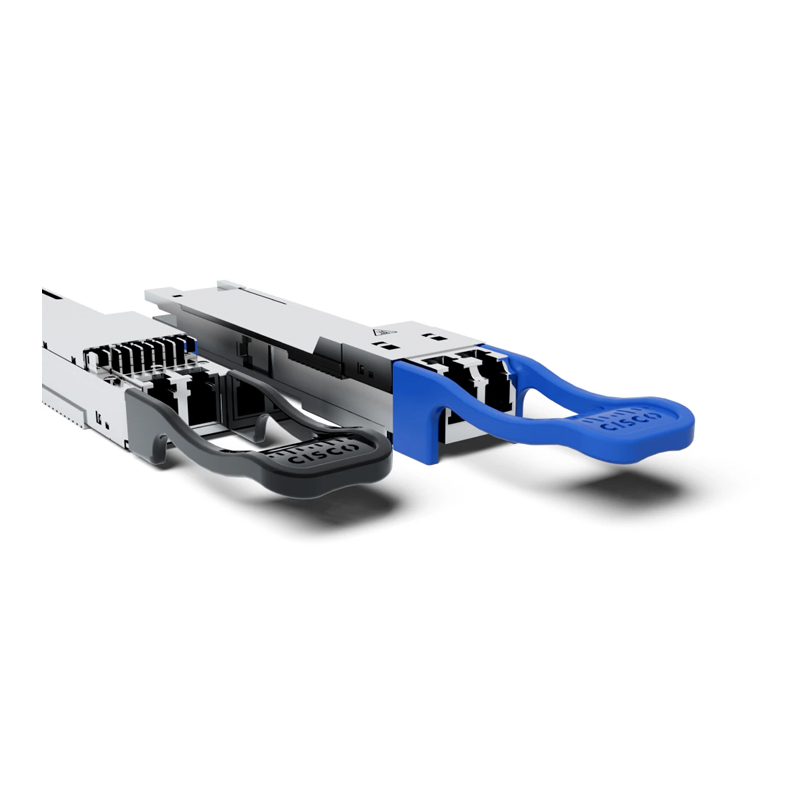Link You To Professional Networks

CPAK-100G-PSM4 Is Cisco 100G CPAK Module For SMF

Cisco CPAK 100GBASE fiber modules for Cisco switches and routers offer a selection of high-density 100-Gbps connectivity solutions. The modules are especially well suited for connections in enterprise and service provider data centers and in service provider edge networks.
The line cards use the Cisco CPAK form factor. They are 20 percent smaller and consume 40 percent less power than C Form-Factor Pluggable 2 (CFP2) modules; they use 70 percent less power than the CFP interface. Cisco CPAK modules give you up to 20 percent greater port density and front-panel bandwidth than competing products.
Choose the model that matches the distance you need to cover, the type of fiber cabling you are using, and the Cisco networking product you are using. Cisco CPAK 100GBASE modules work in the following Cisco networking equipment: ASR 1000 Series Router; ASR 9000 Series Router; CRS-X Carrier Routing System; NCS 2000, 4000, and 6000 Series Routers; the Nexus 7000 and 7700 Series Switches, and the Cisco ONS Transport Platform.



Cisco 100G Module CPAK-100G-PSM4 Specification
|
Description |
100GBASE PSM4 Cisco CPAK Module for SMF |
|
Dimensions |
11.6 x 34.8 x 101.2 mm (0.46 x 1.37 x 3.98 in) |
|
Cisco CPAK port cabling specifications |
|
|
Wavelength (nm) |
1295 to 1325 |
|
Cable Type |
SMF (12 fibers) |
|
Core Size (Microns) |
9-micron core SMF per G.652 |
|
Modal Bandwidth (MHz*km) |
\ |
|
Cable Distance |
500 m |
|
Optical transmit and receive specifications |
|
|
Type |
100GBASE PSM4 SMF |
|
Transmit Power |
Max:+2.0 per lane Min:-9.4 per lane |
|
Receive Power (dBm) |
Max:+9.4 per lane Min:-2.0 per lane |
|
Transmit and Receive Center Wavelength Range (nm) |
Four lanes: 1295 to 1325 |
|
Supported Mode |
1x100G |
|
Supported Protocol |
IEEE 802.3ba |
|
Environmental conditions and power requirements |
|
|
Storage temperature |
-40 to 85° C (-40 to 185° F) |
|
Operating temperature |
0 to 70° C (32 to 158° F) |
|
Power consumption |
At 70° C: <9.0W maximum |
Features and Benefits
Cisco CPAK modules combine high density and bandwidth with low power consumption and many are interoperable with any IEEE-compliant 100GBASE-LR4 or 100GBASE-SR10 for investment protection and product choice. Some models use Cisco Complementary Metal-Oxide Semiconductor (CMOS) photonic technology to provide industry-leading optical integration, performance, power savings, and scalability.

Cisco 100G Module CPAK-100G-PSM4

Cisco CPAK modules are supported on Cisco high-end switches, routers, and transport equipment:
● ASR 1000 Series Router
● ASR 9000 Series Router
● CRS-X Carrier Routing System
● NCS 2000, 4000, and 6000 Series Routers
● Nexus 7000 and 7700 Series Switches
● Cisco ONS Transport Platform


The last few years has seen a rapid transformation and adoption of digital technologies. This puts pressure on the on the Network teams supporting this changing infrastructure - especially when provisioning, managing, monitoring and troubleshooting these diverse devices. Additionally innovations such as Software Defined WAN (SDWAN), Network Function Virtualization (NFV), Open APIs and Cloud Management show great promise in transforming Organizations IT networks. This transformation raises further questions and challenges for the IT teams.
The Cisco Digital Network Architecture (Cisco DNA) is an open, extensible, software-driven architecture that provides for faster innovation, helping to generate deeper insights, and deliver exceptional experiences across many different applications. Cisco DNA relies on intent-based networking, a revolutionary approach in networking that helps organizations automate, simplify, and secure the network.

The Cisco CPAK-100G-PSM4 is sealed in the Cisco original box. We will also pack CPAK-100G-PSM4 with a second box before shipping.






CPAK-100G-PSM4
The following three data rates are supported by the module: 100M/1G/10G/100Gbps. If there are limitations on the platform host, a subset of speeds might be supported.
The platform must be able to cool the transceiver to a maximum of 70°C. Often this requires “front to back” airflow as cooler ambient air may be needed to reduce the temperature of the transceiver.
Yes, the CPAK-100G-PSM4 has minimal and predictable delay performance.
